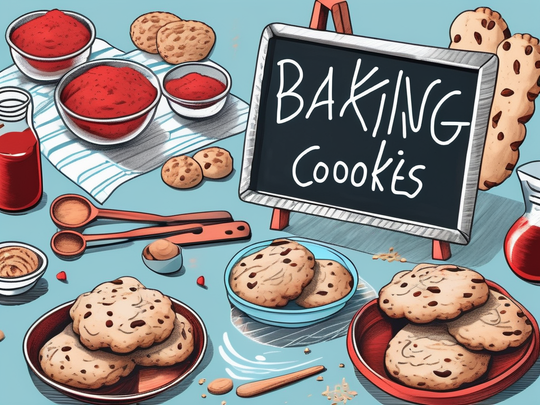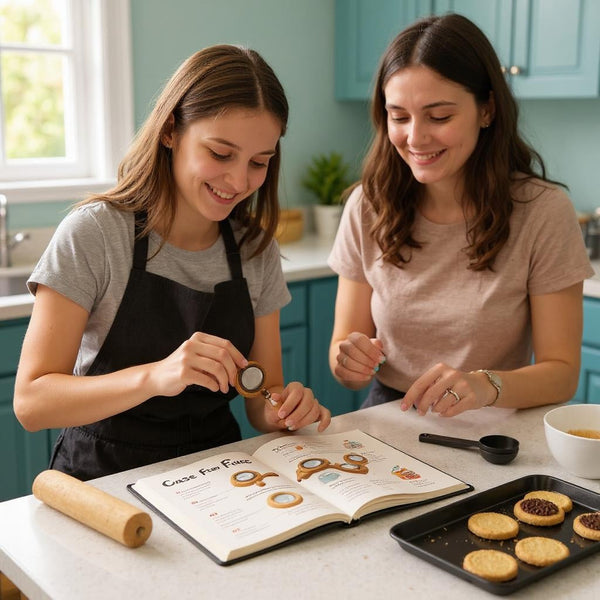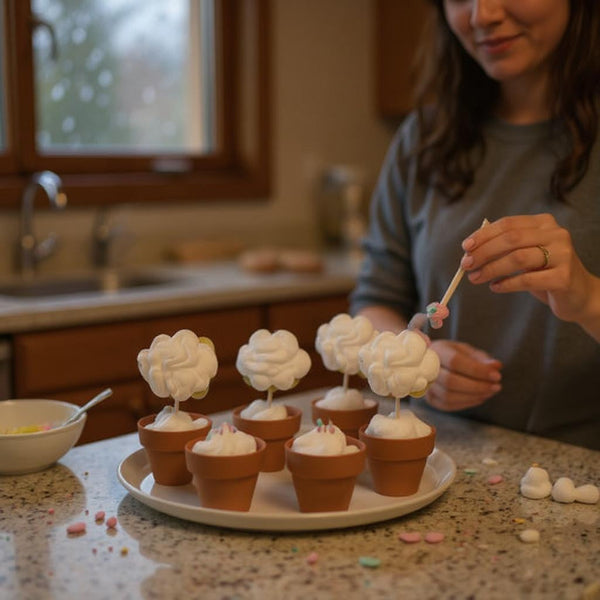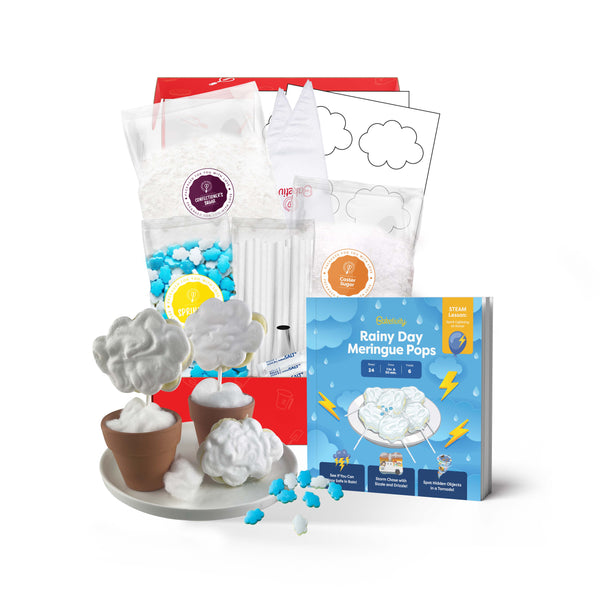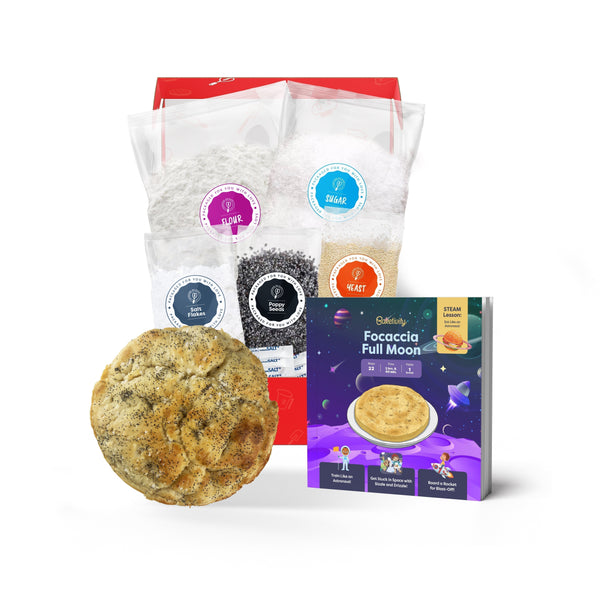Baking is not just a delicious pastime, but it can also be a valuable tool in your homeschooling curriculum. Whether you're looking to teach your children the basics of baking or exploring advanced techniques, this guide has got you covered. In this article, we'll dive into everything you need to know about homeschool baking lessons, from understanding the basics to mastering advanced techniques and even exploring world baking traditions. So let's get started!
Understanding the Basics of Baking
Before we embark on our homeschool baking journey, it's essential to learn the basics. Baking is a science that revolves around precise measurements and specific techniques. By understanding these fundamental principles, you'll be able to create mouth-watering baked goods with confidence.
Importance of Baking in Home Education
Baking not only teaches children essential life skills but also provides a unique opportunity to integrate various subjects into their education. From math (measuring ingredients, fractions) to science (chemical reactions, heat transfer), and even history and culture (exploring traditional recipes from around the world), baking can be a multi-dimensional learning experience for your homeschool.
Imagine your child whisking together the ingredients for a batch of chocolate chip cookies while simultaneously learning about the history of chocolate and its cultural significance in different parts of the world. Or picture them observing the transformation of a simple mixture of flour, water, yeast, and salt into a fluffy, aromatic loaf of bread, all while exploring the science behind the fermentation process. The possibilities for learning through baking are endless.
Essential Baking Tools for Beginners
Before you don your apron and dive into the world of baking, make sure you have the necessary tools of the trade. A good set of measuring cups and spoons, mixing bowls, a whisk, spatula, and baking pans are a few basic essentials to start with. As your baking skills progress, you can invest in more specialized tools and equipment.
However, it's important to note that while having the right tools can enhance your baking experience, they are not the sole determining factor of success. Baking is a skill that can be honed with practice and a deep understanding of the ingredients and techniques involved. So, don't be discouraged if you don't have all the fancy gadgets just yet. With a little creativity and resourcefulness, you can achieve delicious results with the tools you already have in your kitchen.
Basic Baking Terminology
As with any field, baking has its own language. Understanding the terminology is key to following recipes and gaining a deeper understanding of the baking process. From familiarizing yourself with words like 'sift,' 'cream,' and 'fold,' to learning the difference between baking soda and baking powder, this section will demystify common baking terms.
For example, did you know that 'sifting' flour not only removes lumps but also aerates it, resulting in lighter and fluffier baked goods? Or that 'creaming' butter and sugar together creates air pockets that contribute to the tender texture of cakes and cookies? These seemingly small details can make a significant difference in the final outcome of your baked treats.
By expanding your baking vocabulary, you'll be able to confidently navigate through recipes, troubleshoot any issues that may arise, and even experiment with your own unique creations. So, let's dive into the world of baking terminology and unlock the secrets to becoming a master baker!
Planning Your Homeschool Baking Curriculum
Now that you have a handle on the basics, it's time to plan your homeschool baking curriculum. By setting learning objectives, creating a lesson plan, and incorporating baking into other subjects, you can ensure a comprehensive and engaging baking education for your children.
Setting Learning Objectives
Identify the skills and knowledge you want your children to gain through their baking lessons. Whether it's mastering specific recipes, understanding the science behind baking, or exploring different cultural traditions, having clear learning objectives will guide your curriculum planning.
For example, you might want your children to develop their creativity and problem-solving skills by experimenting with different flavor combinations or designing their own unique recipes. You could also focus on teaching them the importance of kitchen safety and proper food handling techniques to instill good habits from an early age. By setting specific learning objectives, you can tailor your homeschool baking curriculum to meet your children's individual needs and interests.
Creating a Baking Lesson Plan
A well-structured lesson plan keeps your homeschool baking lessons organized and ensures you cover all the necessary topics. Divide your curriculum into manageable segments, focusing on different aspects of baking. This approach allows your children to gradually build their skills and knowledge, starting from simple recipes and progressing to more complex techniques.
Consider incorporating a variety of baking methods, such as baking bread, cakes, cookies, and pastries, to provide a well-rounded baking education. You can also introduce your children to different baking tools and equipment, teaching them how to properly use and care for them. By including hands-on activities and opportunities for experimentation, you can make the learning process fun and engaging for your children.
Incorporating Baking into Other Subjects
Integrating baking into other subjects brings learning to life and adds depth to your homeschool curriculum. For example, use math skills to calculate ingredient measurements, explore the history and cultural significance of recipes from different regions, or study the science of heat transfer and chemical reactions during the baking process. The possibilities are endless.
Additionally, you can incorporate language arts by having your children write their own recipes or create a baking-themed story. Social studies can be incorporated by exploring the origins of different baking techniques and traditions around the world. Art can be integrated by encouraging your children to decorate their baked goods creatively, using various icing techniques or food coloring. By connecting baking to other subjects, you provide a well-rounded education that sparks curiosity and fosters a love for learning.
Starting with Simple Baking Recipes
Now that you have your curriculum in place, it's time to roll up your sleeves and delve into some delicious recipes. Starting with simple recipes allows younger children to grasp the basics while building confidence in the kitchen. Here are a few easy recipes to get you started.
Before you jump into the world of baking, it's important to set up a designated workspace for your cooking adventures. Make sure your kitchen is clean and organized, with all the necessary ingredients and tools within reach. Creating a welcoming and efficient baking environment will enhance the overall experience for you and your young chefs.
Easy Recipes for Younger Children
Younger children will enjoy recipes that are simple, fun, and require minimal supervision. Chocolate chip cookies, banana bread, and homemade pizza dough are perfect options. These recipes introduce basic measuring, mixing, and baking techniques, all while creating tasty treats.
When baking with younger children, it's a great opportunity to teach them about kitchen safety and cleanliness. Emphasize the importance of washing hands before and after handling food, as well as using oven mitts to handle hot pans. These habits will instill good practices early on and ensure a safe and enjoyable baking experience for everyone involved.
Intermediate Recipes for Older Students
As your children's skills progress, challenge them with more advanced recipes. Apple pie, cinnamon rolls, and muffins with various flavor combinations are excellent choices. These recipes allow for more complex techniques like dough rolling, layering, and flavor experimentation.
Encourage older students to get creative in the kitchen by experimenting with different ingredients and flavor profiles. Baking is not only a science but also an art, so let them express themselves through their culinary creations. This sense of freedom and exploration will foster a deeper appreciation for the baking process and inspire a lifelong love for cooking.
Baking Bread: A Comprehensive Guide
There's nothing quite like the aroma of freshly baked bread. Teaching your children the art of breadmaking opens up a world of possibilities. From classic white bread to hearty whole wheat loaves, this comprehensive guide will walk you through each step of the breadmaking process.
When diving into the world of breadmaking, emphasize the importance of patience and precision. Bread dough can be temperamental and requires careful attention to detail. Teach your children the art of kneading dough to develop gluten and achieve the perfect texture in their bread. Watching the dough rise and transform into a golden loaf will be a rewarding experience for both you and your young bakers.
Advanced Baking Techniques
For those looking to take their homeschool baking lessons to the next level, it's time to explore advanced techniques. Amp up your baking skills by mastering the art of pastry making, understanding the science behind baking, and exploring the rich traditions of baking from around the world.
Mastering the Art of Pastry Making
Pastry making is a true culinary art form. From flaky pie crusts to delicate puff pastry, learning the techniques of pastry making will elevate your baking to new heights. This section will guide you through essential skills such as dough lamination, blind baking, and creating stunning decorative designs.
Understanding the Science of Baking
Baking is equal parts art and science. By understanding the scientific principles at play, you'll be able to troubleshoot recipe failures and achieve consistent baking success. This section will delve into topics like gluten formation, leavening agents, and the Maillard reaction, helping you become a more confident and knowledgeable baker.
Exploring World Baking Traditions
Baking traditions vary across the globe, and this section invites you to explore them. From French pastries to Italian gelato and Middle Eastern baklava, learn about different cultures through the lens of baking. Discover new flavors, techniques, and ingredients that will expand your culinary horizons.
Now that you have the ultimate guide to homeschool baking lessons, it's time to embark on this delicious journey with your children. Have fun, be creative, and enjoy the pleasure of baking together in the comfort of your own home. Happy baking!
